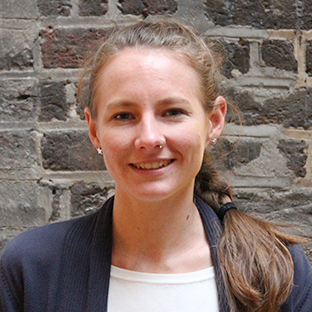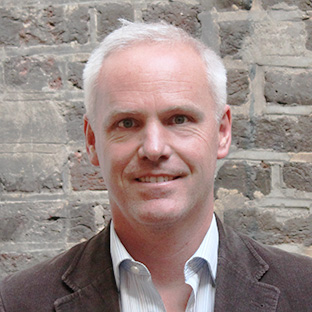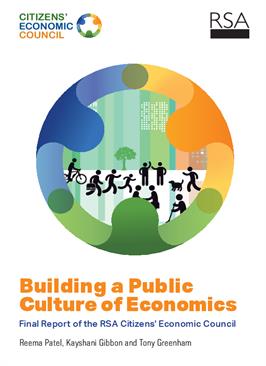Britain has never had especially high levels of trust in economic and political institutions, but in recent years levels of trust have fallen to a point that calls the legitimacy of those institutions into question.
Our motivation for the Citizens’ Economic Council programme of work, was a view that the quality of economic debate in the UK was poor and deteriorating. Polarised media narratives, and a growing polarisation amongst communities, is threatening the democratic fabric of our society. As the findings in this report: ‘Building a public culture of Economics’, reveal, there is an urgent need to rebuild trust in, and the trustworthiness of, political and economic institutions. We provide several recommendations by which to strengthen the democratic management of our economy.
The RSA’s Citizens’ Economic Council (CEC) was a two year programme of activities with a number of components. At the core was the Council itself - two groups of citizens in London and Manchester, both meeting on four occasions before coming together for a combined final summit in Birmingham. In total 59 citizens participated in these deliberation days. We preceded the convening of the Council with a series of 11 half-day workshops around the UK, hearing from 190 citizens in some of Britain’s most ‘left behind’ communities and networks. We also used an online platform to crowdsource 47 policy ideas in response to three challenges. This report also draws on our analysis of relevant literature, engagement with experts in the fields of democracy and economics, and on the results of an opinion poll we commissioned to examine public attitudes to economic policymaking.
Our report evidences a widening chasm, not just between Michael Gove’s infamous “expert” and the “people [citizens] in this country”,1 but also between citizen and citizen. These diverging views in themselves are not problematic, but we argue that it is the failure of these perspectives to engage critically and respectfully with each other that is undermining the quality of public discourse on the economy. The process of deliberation, where citizens exchange arguments and consider different claims that are designed to secure the public good, could be a way by which to start these necessary and meaningful conversations.
We argue that conversations about the economy start at home. To build a strong democratic discourse about economics it is essential to meet people where they are; to proceed from people’s everyday experience of the economy through work, at play and in their communities. This suggests that the most fruitful domain for applying deliberative democracy may be, at least initially, at the local and regional level. Our opinion poll with Populus (conducted at the beginning of 2018) emphasised the scale of the challenge and the opportunity, with only 16 percent of people reporting they felt they had influence over Local Enterprise Partnerships, and 33 percent saying they had influence over their local council.2
Through the following recommendations, we suggest five routes by which to build a public culture of economics:
1) Integrate citizen engagement into local government and devolution deals
Devolution offers a chance to boost interest in participatory budgeting in the UK and pioneer the use of Citizen Reference Panels to deliberate on regional economic strategy and devolution deals.
2) The Bank of England should establish regional Citizens’ Reference Panels
We propose that the Bank of England pilot Citizens’ Reference Panels for each of its 12 Regional Agents, to provide additional sources of information about the economy which can aid decision-making and communication of the Bank’s role and policies.
3) Central Government commission regional Citizens’ Reference Panels for major economic decisions
We recommend that HM Treasury and other economic policymaking departments should commission Citizens’ Reference Panels for major economic decisions and publish the results of the Panels’ deliberations.
4) Support citizens and civil society organisations to directly scrutinise economic policy
We recommend that national and local government expand the use of open data and online data tools to allow public scrutiny of economic data, and provide resources to civil society organisations to provide independent analysis of policy.
5) Establish an expert resource centre on participatory economics
We propose the creation of an expert resource centre on participatory economics within government, drawing upon a range of public engagement and participation techniques so that policymakers can best understand when and in what context deliberative forms of engaging the public are most appropriate and necessary.
We argue deliberative processes add something different and valuable to our democratic system. Deliberation emphasises collaboration, cohesion and empathy in political discourse, greatly enhances the sense of agency of the participants and, we contend, could also increase the sense of agency and degree of trust and confidence among the wider public if the use of deliberative democracy were to become widespread, consistent and well publicised.
Read our report to explore more.
Download the report: Creating a public culture of economics (PDF, 2MB)
Download the full polling figures (PDF, 1MB)
Read about creating a public culture of economics (on Medium)
Related download: CEC roadshow report (PDF)
pdf 2 MB
Authors



Related articles
-
Why Theresa May should reach for her inner Pankhurst: time for a National Citizens’ Jury on Brexit
Blog
Ed Cox
Ed Cox argues why we need a National Citizen's Jury on Brexit.
-
Two countries - polarised until we fix our democracy
Blog
Anthony Painter
Anthony Painter explores what the local elections say about the state of British politics and what that means for our ability to confront common challenges.
-
Democratic deliberation should be an integral part of policy making
Blog
Matthew Taylor
Matthew Taylor discusses why democratic deliberation is his chosen topic for his annual lecture.



